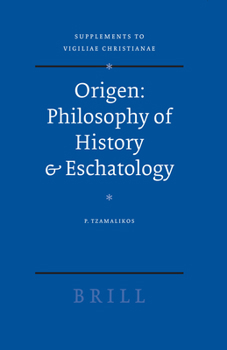Origen: Philosophy of History & Eschatology
A common accusation made against Origen is that he dissolves history into intellectual abstraction and that his eschatology (if this is recognized at all) is notoriously obscure. In this new work, the author draws on an impressive range of bibliography to consider Origen's Philosophy of History and Eschatology in the widest context of facts, documents and streams of thought, including Classical and Late Antiquity Greek Philosophy, Gnosticism, Hebraism and Patristic Thought, both before Origen and well after his death. Against claims that he causes history to evaporate into barren idealism, his thought is shown to be firmly grounded on his particular vision of historical occurences. Confronting assertions that Origen has no eschatological ideas, his eschatology is shown rather to have made a distinctive mark throughout his works, both explicitly and tacitly.
In Origen's view, history was the foundation of scriptural interpretation, a teleological process determined by factors and functions such as providence - prophecy - promise - expectation - realization - anticipation - faith - anticipation - hope - awaiting for - fulfilment - end. Since 1986, the author has argued for the unpopular thesis that Origen is, in many respects, an anti-Platonist. Nevertheless, the author casts light upon the Aristotelian rationale of Origen's doctrine of apokatastasis, arguing that its validity is bolstered by ontological rather than historical premises. The extent of Origen's influence upon what is currently regarded as 'orthodoxy' turns out to be far wider and more profound than has hitherto been acknowledged.
In Origen's view, history was the foundation of scriptural interpretation, a teleological process determined by factors and functions such as providence - prophecy - promise - expectation - realization - anticipation - faith - anticipation - hope - awaiting for - fulfilment - end. Since 1986, the author has argued for the unpopular thesis that Origen is, in many respects, an anti-Platonist. Nevertheless, the author casts light upon the Aristotelian rationale of Origen's doctrine of apokatastasis, arguing that its validity is bolstered by ontological rather than historical premises. The extent of Origen's influence upon what is currently regarded as 'orthodoxy' turns out to be far wider and more profound than has hitherto been acknowledged.
Format:Hardcover
Language:English
ISBN:9004156488
ISBN13:9789004156487
Release Date:April 2007
Publisher:Brill
Length:498 Pages
Weight:2.35 lbs.
Dimensions:1.4" x 6.5" x 9.7"
Customer Reviews
0 rating





